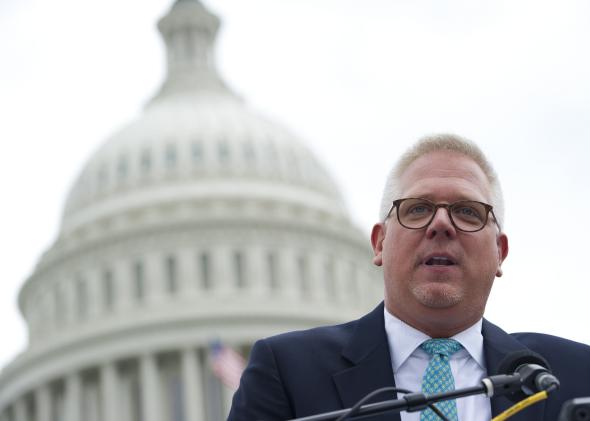Can’t Sleep! Caliphate Will Eat Me!

Photo by Saul Loeb/AFP/Getty Images
Last week, the conservative election lawyer and pundit J. Christian Adams jabbed me over a post written in 2011.
Remember when @daveweigel snarked that @glennbeck and @MittRomney were talking about a #Caliphate in 2011? #Update http://t.co/8VuhGhVdrz
— Christian Adams (@ElectionLawCtr) August 25, 2014Last night, another conservative Twitter attempted to douse me with an ice bucket of shame over the same blog post.
@daveweigel hey remember when you mocked glenn beck for talking about an Islamic caliphate? Yeah...
— Zachary Corrigan (@zcorrigan) September 3, 2014Honestly, I didn't remember that exact post, but thanks to Adams I've read it again. And the gulf between what Glenn Beck was talking about and what the 10,000 or so murderers of ISIS are able to accomplish is so large as to be comical. Not that Beck's initial monologue wasn't comical. Today, Beck is a well-paid advocate for whatever FreedomWorks is doing, and a part-time apologizer for his (far more popular) persona of the early Obama years, but in 2011 Beck scared the bejesus out of his viewers by speculating that a caliphate could grow like cancer to cover much of Africa, central Asia, and Europe.
"You have Somalia and Iran already in green," said Beck. "Now, let's add Tunisia. Former Tunisian government was considered one of the most secular and corrupt governments in the Arab world. The poor and the angry demanded changes. Most dangerous scenario is that radical Muslims seize power and put Sharia law into place."
That was a dangerous-sounding scenario. It did not happen. Tunisia is currently run by technocrats who were handed power after an Islamist party failed to govern effectively. Beck went on to worry that the Muslim Brotherhood would take power in Egypt, and that the result "could very easily be 1979 Iran." The Muslim Brotherhood did win an election, before being overthrown in popular protests and being replaced by a new military government. Not quite 1979 Iran.
Seriously, just read Beck's monologue. The host speculated that the weak economies of Spain and Portugal and the Muslim populations of France and Great Britain left them exposed to some kind of Shariah revolution. This was what "caliphate" meant—not a gang of killers terrorizing parts of Iraq, but a green wave spreading across the world that the early Muslims almost conquered.
This is a pretty silly dispute—it started on Twitter, after all—but the overrating of ISIS is one of the driving trends in politics right now. As Michael Calderone points out, the New York tabloids are leading with ISIS news, with photographs taken from the propaganda videos the group shot while beheading journalists. There's an election in two months, just as there was an election 12 years ago, in the run-up to the Iraq war. The dividends of convincing voters that their country is under attack, and the barbarians who killed James Foley could be on your lawn if President Obama doesn't come up with a strategy, are bountiful and obvious.
Strangely not making the covers of the tabloids: this AP story.
The FBI and Homeland Security Department say there are no specific or credible terror threats to the U.S. homeland from the Islamic State militant group.
An intelligence bulletin, issued to state and local law enforcement, says while there’s no credible threat to the U.S. as a result of recent American airstrikes in Iraq, officials remain concerned that Islamic State supporters could attack overseas targets with little warning.
It's actually quite easy to consider the actual threat of ISIS without wildly overrating it. More than easy, it's essential. Baiting America into overreaching and overcommitting to military action has been the explicit goal of terrorist groups for as long as we've been failling for it. "All that we have to do," said Osama Bin Laden in 2004, "is to send two mujahedeen to the furthest point east to raise a piece of cloth on which is written al Qaeda, in order to make generals race there to cause America to suffer human, economic and political losses."
That's what makes the brain-dead political conversation about ISIS so frustrating. Because the president said "we have no strategy" in the long term in one press conference, domestic coverage tends to hype the threat of ISIS and ask how the administration failed to prevent the rise of a foe that's been murdering American journalists in Iraq. The administration itself fueled the hype when Chuck Hagel called ISIS "an imminent threat to every interest we have." But it's remarkable that you can read columns or stories about the administration's weak response without learning that, since August, there have been more than 124 airstrikes on ISIS, and that the James Foley snuff film was released after ISIS was humiliated by airstrikes that ended its control of the Mosul dam.
You could, I suppose, live in fear of ISIS and worry that failure to drive it back into the Levant will lead to terrorism at home, and that there is now an existential threat to American power. Or you could look at the difference between ISIS's operational zone of control and the caliphate that Glenn Beck worried would soon be holding calls to prayer in Oxford and Cannes, and consider how easy it is to overrate an enemy.

